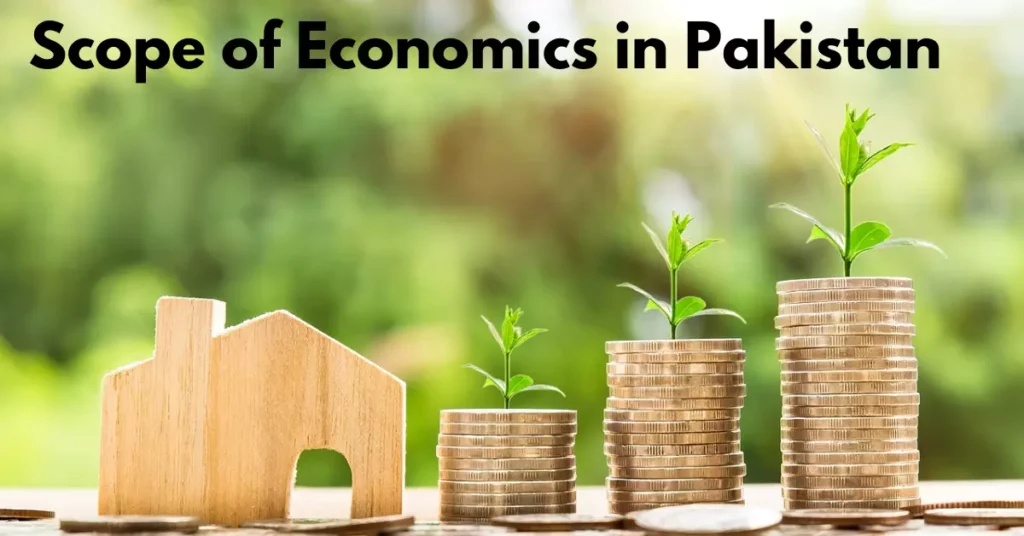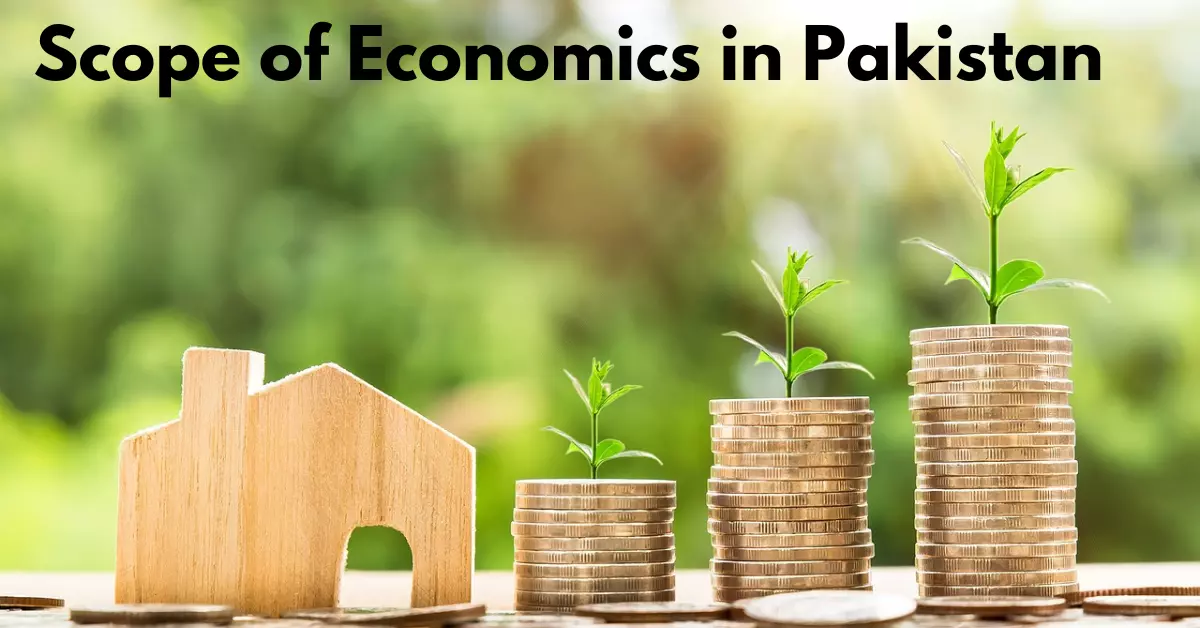In Pakistan, the field of economics plays a role in shaping one’s career, income, and job prospects. It is essential to have an understanding of the opportunities after graduation, the various career paths, and the potential earnings.

This article explores the world of economics in Pakistan providing insights into options, career trajectories, and the changing job market. Let’s delve into the realm of economics in Pakistan and unlock a multitude of possibilities.
Understanding BS Economics
Explaining BS Economics
The BS Economics program is a degree that explores various aspects of economic theory, analysis, and practical application. In Pakistan, this course provides a grasp of principles, policy structures, and analytical instruments that are essential, for understanding the dynamic nature of the country’s economy.
Scope of BS Economics in Pakistan
The potential, for BS Economics, in Pakistan is extensive covering a range of areas including finance, policy development, research, and consulting. Individuals who complete this program have an understanding of theories statistical analysis and critical thinking skills making them well-suited for various professional roles.
Best Universities Offering BS Economics
There are regarded universities, in Pakistan that provide Bachelor of Science (BS) programs in Economics each offering their distinctive curriculum and areas of specialization. Universities such as Government College University Lahore, University Of The Punjab and University Of Central Punjab have gained recognition for their coursework experienced faculty members and exposure to real-world industry practices. These factors make them excellent choices for individuals in pursuing a BS degree, in Economics.
The program typically encompasses a range of subjects including microeconomics, macroeconomics, econometrics, financial economics, and public policy. This ensures that students develop skills and gain a profound understanding of economic structures.
Get more information: Scope of Electrical Engineering in Pakistan: Perfect Guide 2024
Career Paths in Economics
Jobs for Economics Graduates
There are career opportunities, for economics graduates in Pakistan across different industries. They are highly desirable in fields such as banking and finance government agencies, international organizations, research companies, academia, and the corporate sector. Fresh graduates can find roles, like analyst, market researcher, policy analyst, and economic consultant to start their careers.
Career Opportunities After BS Economics
A Bachelor of Science, in Economics opens up a range of career options. Graduates have the opportunity to specialize in areas such, as development economics, international economics, or public policy by pursuing studies. Alternatively, they can enter the job market directly. Apply their skills and economic knowledge in roles that involve data analysis, policy development, and strategic planning.
Job Market Trends and Demands
The job market, for individuals with an economics degree is constantly changing due to advancements in technology and shifts in the economy. It has become increasingly important for economists to have skills in data analysis, statistical modeling, and economic forecasting. Exciting fields, like fintech, development, and data-driven policymaking offer possibilities for economists to make significant impacts.
Graduates who have studied economics and possess skills in thinking, problem-solving, and a solid grasp of principles continue to be sought after by various industries. They play a role, in driving growth and influencing decision-making processes.
M.A. Economics: Enhancing Scope
Pursuing M.A. Economics
Once you have successfully obtained a bachelor’s degree in Economics choosing to pursue a Masters’s degree, in Economics (M.A. Economics) can open up opportunities for you to gain an understanding and expertise in this field. In Pakistan M.A. Economics programs aim to expand on the principles that were learned during your studies exploring more complex economic theories, research methods, and policy analysis.
Scope Post-Graduation
Having a master’s degree, in Economics provides individuals with career prospects granting access to positions like economist, economic advisor, research analyst, and policy consultant. Those who hold an M.A. in Economics possess a comprehension of models, empirical analysis, and specialized fields such as econometrics or development economics, which makes them highly valuable assets, across different industries.
Advanced Career Prospects
Having a Masters’s degree, in Economics opens up career paths in academia, government agencies, international organizations, think tanks, and research institutions. The advanced knowledge and skills gained through the master’s program allow graduates to make contributions to policy development, economic research, and data-driven decision-making. This does not improve their career opportunities. Also amplifies their influence, within the field.
Moreover, pursuing a Ph.D. in Economics after an M.A. can lead to further specialization, research opportunities, and high-level positions in academia or as senior economists in specialized areas.
Economist’s Role & Responsibilities

Responsibilities in the Field
Economists have a role, in examining data, patterns, and policies to offer valuable insights and advice to organizations and governments. They leverage their knowledge to conduct research build models and predict trends that can assist in making decisions.
The responsibilities of economists include evaluating the effects of policies on aspects, like employment, inflation, and growth. They actively contribute to shaping policies by providing recommendations based on their analyses and forecasts.
Practical Applications in Pakistan
In Pakistan, economists play a role, in shaping policies addressing socio-economic concerns and providing guidance on development strategies. They are employed in sectors such as government institutions, research organizations, and the private sector. Economists utilize theories and methodologies to tackle real-world issues.
Economists actively analyze market dynamics assess industry performance and offer advice on strategies for achieving growth. Their expertise helps in comprehending consumer behavior understanding market fluctuations and assessing the impact of trends, on the local economy.
Economic Salaries in Pakistan
Salary Insights for Economists
In Pakistan, economists receive salaries depending on factors including their education, experience, industry, and job position. When starting their careers economics graduates usually receive entry-level salaries ranging from [Salary Range], per month. These salaries can increase over time as they demonstrate their performance and expertise, in the field.
Factors Affecting Salaries
Several factors influence economists’ salaries in Pakistan. Having degrees, like a Master’s in Economics or a Doctorate can influence one’s earning capacity. Furthermore focusing on areas such, as econometrics, finance or policy analysis could potentially open doors to lucrative career opportunities. Work experience, particularly in esteemed organizations or government bodies, can also elevate salaries.
Salary Ranges in Different Sectors
Economists working in sectors like banking, finance, and research institutions tend to command higher salaries due to the specialized nature of their roles. Government positions might offer stable but comparatively moderate salaries.
On the other hand, economists working for consulting firms or large multinational companies often receive compensation packages due, to the high demand, for their analytical abilities and specialized knowledge.
Outlook and Growth of Economics in Pakistan
Projected Growth of the Field
The economic landscape, in Pakistan is set to experience expansion, fueled by changing market trends, advancements in technology, and the country’s commitment to progress. The growing integration into the economy and the requirement for policy decisions based on evidence contribute to the rising need for economists, with expertise.
Read more: Scope of Environmental Science in Pakistan: Career & Jobs
Opportunities and Challenges Ahead
The realm of economics offers possibilities and obstacles. As Pakistan aims to achieve stability and progress there is an increasing demand, for economists who can adeptly navigate economic terrains analyze data, and devise impactful strategies. The changing job market necessitates economists who possess expertise in skills such, as data analytics, machine learning, and economic modeling.
Educational and Skill Development Initiatives
To keep up with the changing economy educational institutions are making changes, to their economics programs by incorporating skills, interdisciplinary approaches, and real-world applications.
Moreover, efforts are being made to improve the quality of analysis and policy formulation through initiatives that encourage research, innovation, and collaboration, among academia, industry, and government sectors.
The outlook, for economics in Pakistan seems bright with a range of possibilities for those interested in pursuing careers in this field. It will be important for economists to embrace advancements encourage innovation and refine their abilities to make meaningful contributions, to the country’s economic growth and policy frameworks.
At the End:
Economics, in Pakistan, offers a range of opportunities for individuals interested in understanding the dynamics between markets, policies, and societal progress. In this journey of exploration, we have discovered the importance of pursuing a bachelor’s degree in Economics (BS Economics) as a foundation, for growth.
It offers opportunities to explore career paths in fields such, as finance, government, research, and academia. The program provides graduates, with the skills and economic knowledge necessary for navigating the intricacies of Pakistan’s economy.
Pursuing a Master, in Economics (M.A. Economics) can greatly enhance your education. Open up opportunities for positions in policy advising and research. By obtaining a degree you can have an impact, on shaping economic policies and contributing to sustainable growth.
Economists play a role, in driving change shaping policies, and guiding businesses toward growth. Their expertise in analyzing data, modeling trends, and formulating policies drives innovation. Informs strategic decision-making across different areas.
As Pakistan enters an era of transformation and economic reform the demand for economists is set to increase. The changing landscape requires adaptability, ongoing learning, and a combination of principles with modern analytical tools.
The field of economics in Pakistan offers opportunities for growth and development. For aspiring economists, embracing this discipline means embarking on a journey of learning, contributing to the nation’s progress, and shaping a prosperous future.
FAQs: Scope of Economics in Pakistan
Choosing between BBA and BS Economics depends on career goals. BBA focuses on business, while BS Economics delves deeper into economic theory and analysis for diverse career pathways.
Yes, BS Economics offers diverse career paths in finance, government, research, and more, providing analytical skills valuable across various industries.
BS Economics involves complex theories and data analysis, challenging but rewarding. Dedication and interest in economic concepts make the journey smoother.
An economist’s salary varies based on expertise and sector. Top economists in senior roles or consultancy positions can earn significantly higher salaries.
Anyone intrigued by how societies function, enjoy analyzing trends, and desire versatile career options in finance, policy, or research should consider studying economics.
